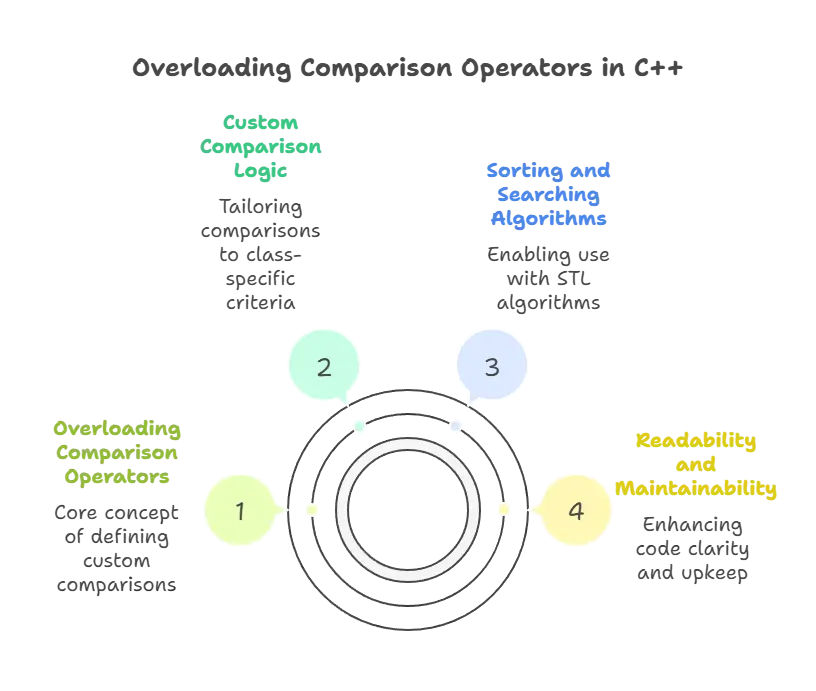C++ offers a rich set of built-in comparison operators like == (equal to), != (not equal to), < (less than), > (greater than), <= (less than or equal to), and >= (greater than or equal to). These operators work seamlessly with built-in data types like integers, floats, and characters. However, when you create custom classes in C++, you might want to define how objects of that class should be compared based on their specific member variables. This is where overloading comparison operators comes in.
Why Overload Comparison Operators?
- Custom Comparison Logic: The default behavior of comparison operators might not always align with your class’s intended comparison criteria. Overloading allows you to define how objects should be compared based on their member variables.
- Sorting and Searching Algorithms: Standard Template Library (STL) algorithms like
sortandfindrely on overloaded comparison operators to order and search for elements within containers. By overloading these operators, you ensure your custom classes can be effectively used with such algorithms. - Readability and Maintainability: Overloaded comparison operators enhance code readability by making comparisons between objects more intuitive and self-explanatory.

Syntax of Overloading Comparison Operators
The syntax for overloading comparison operators is similar for all comparison operators:
bool operator==(const ClassName &rhs) const;
Here, ClassName is the name of the class, and rhs is a reference to the object being compared against.
Implementation of Overloading Comparison Operators
Let’s illustrate the implementation of overloading comparison operators with examples.
Point Class
Consider a simple Point class representing a point in 2D space.
#include <iostream>
class Point {
private:
int x, y;
public:
Point(int x = 0, int y = 0) : x(x), y(y) {}
// Overloading equality operator (==)
bool operator==(const Point &rhs) const {
return x == rhs.x && y == rhs.y;
}
};
int main() {
Point p1(3, 4);
Point p2(3, 4);
Point p3(5, 6);
std::cout << "p1 == p2: " << (p1 == p2) << std::endl; // true
std::cout << "p1 == p3: " << (p1 == p3) << std::endl; // false
return 0;
}
// output //
p1 == p2: 1
p1 == p3: 0
Explanation:
- We define a class called
Point, which represents a point in 2D space with coordinatesxandy. - The class has a constructor that initializes the
xandycoordinates. It has default parameter values of 0, so we can create points without specifying coordinates. - We overload the equality operator (
==) inside thePointclass. - The overloaded
==operator takes a const reference to anotherPointobject (rhs) as a parameter. - Inside the operator function, we compare the
xandycoordinates of the current object (this) with the coordinates of the object being compared (rhs). - If both sets of coordinates are equal, the function returns
true; otherwise, it returnsfalse.
In the main() function, we create three Point objects: p1, p2, and p3, with different coordinates.
- We then use the overloaded
==operator to compare pairs of points: p1 == p2: This comparison evaluates totruebecausep1andp2have the same coordinates.p1 == p3: This comparison evaluates tofalsebecausep1andp3have different coordinates.
Overloading comparison operators in C++ allows customizing the comparison behavior for user-defined types. By providing custom implementations for these operators, we can define how objects of our classes are compared, enabling more intuitive and efficient code.Happy coding !❤️
